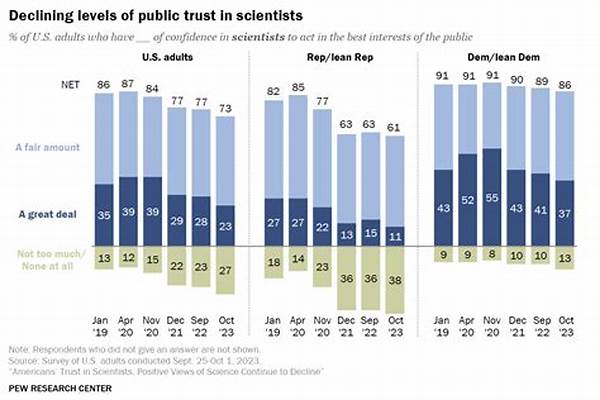The Erosion of Confidence
Public trust in journalism has witnessed a significant decline over recent years, a phenomenon that poses a grave challenge to the integrity and functionality of democratic societies. The declining public trust in journalism is attributed to several factors, including perceived biases, misinformation, and the increasing polarization of news outlets. In an era where information is abundant, distinguishing between credible reporting and misleading narratives has become an arduous task for audiences.
Moreover, the digital revolution has amplified the reach of journalism while simultaneously exacerbating the dissemination of unverified information. The pervasive influence of social media platforms often blurs the line between fact-based reporting and opinion-based content, thereby contributing to a skeptical public outlook. As trust diminishes, the role of journalists as purveyors of truth is undermined, leading to potential adverse consequences for public discourse and informed decision-making. Addressing the declining public trust in journalism necessitates a concerted effort from media organizations to reinforce ethical standards and prioritize transparency.
Factors Contributing to Declining Trust
1. Bias Perception: Many perceive news outlets to have underlying agendas, leading to a decline in public trust.
2. Misinformation Proliferation: With the ease of accessing and sharing information online, misinformation spreads rapidly, undermining journalistic credibility.
3. Political Polarization: Media polarization often mirrors political divides, further contributing to declining public trust in journalism.
4. Erosion of Ethical Standards: Sensationalism and compromised journalistic ethics contribute to the public’s growing skepticism.
5. Social Media Influence: The rise of social media as a news source challenges traditional journalism, often mixing opinions with factual reporting, which erodes trust.
The Impact on Democratic Institutions
The declining public trust in journalism has far-reaching implications for democratic institutions. When citizens lose faith in the media’s ability to provide objective and factual information, the foundation of informed electoral decision-making is jeopardized. This erosion of trust can lead to increased apathy and disengagement from civic duties, further exacerbating the challenges faced by democracies worldwide.
Furthermore, the media serves as a watchdog that holds governmental and corporate powers accountable. If this role is compromised due to diminishing public confidence, it opens a pathway for unchecked power and potential abuses. Thus, restoring trust in journalism is critical not only for the media industry but also for the health of democratic processes. Strategies to rebuild this trust necessitate a recommitment to unbiased reporting, stringent fact-checking, and a transparent dialogue with the public.
Steps Towards Rebuilding Trust
1. Promoting Media Literacy: Educating the public on discerning credible sources from unreliable ones is crucial in addressing declining public trust in journalism.
2. Transparency Initiatives: Media outlets need to enhance transparency in their reporting processes to rebuild audience confidence.
3. Strengthening Editorial Integrity: Upholding strict ethical standards can mitigate perceptions of bias, crucial for rebuilding trust.
4. Engagement with Audiences: Establishing open communication channels with the public fosters trust and accountability in journalism.
5. Investment in Fact-Checking: Amplifying fact-checking efforts helps combat misinformation, crucial for restoring faith in journalism.
6. Collaborative Platforms: Journalists can leverage collaborative efforts to increase oversight and credibility.
7. Professional Development: Continuous training for journalists on ethical reporting practices underscores commitment to trustworthy journalism.
8. Diverse Representation: Reflecting diverse perspectives within newsrooms can combat bias perceptions and enhance public trust.
9. Critical Self-Reflection: Media organizations should consistently evaluate their approaches and adapt to the evolving media landscape.
10. Regulatory Frameworks: Implementing policy frameworks that discourage misinformation and support ethical reporting can foster public trust.
Challenges Ahead
Despite recognized solutions, the journey toward restoring declining public trust in journalism is fraught with challenges. Rapid technological advancements and a dynamic media landscape often outpace current regulatory frameworks and ethical guidelines. Consequently, journalists must navigate these complexities while maintaining the highest standards of accuracy and impartiality. Financial pressures within the industry also pose significant hurdles, leading some outlets to prioritize profit over principled reporting.
The pervasive skepticism surrounding media institutions necessitates innovative approaches to rebuild trust. Media organizations must demonstrate an acute awareness of audience concerns and commit to transformative strategies that align with contemporary expectations. The future of journalism lies in its ability to adapt without compromising foundational values of truth and fairness.
The Role of Technology
Technology’s dual role as both a catalyst for declining public trust in journalism and a potential remedy cannot be overstated. While digital platforms have enabled the rapid spread of misinformation, they also offer opportunities to engage audiences with interactive and transparent reporting. Media outlets can harness technological advancements to improve fact-checking processes, create immersive storytelling experiences, and foster real-time audience feedback.
Nevertheless, reliance on technology presents inherent risks, such as algorithmic biases and data privacy concerns. Journalists must navigate this terrain judiciously, ensuring that technological integration enhances rather than diminishes journalistic integrity. Rebuilding public confidence in journalism requires leveraging technology responsibly to bridge existing trust gaps and reaffirm journalism’s role as a cornerstone of democracy.
Conclusion
In summary, the declining public trust in journalism remains a pressing issue that demands immediate and sustained attention. The erosion of this trust not only threatens the future of journalism but also undermines the very essence of informed democratic participation. Addressing this crisis involves a multidimensional approach that encompasses ethical journalism, media literacy, and the responsible use of technology.
Rebuilding trust requires collaborative efforts from journalists, media organizations, policymakers, and the public. By embracing innovative solutions and upholding rigorous ethical standards, the media industry can work towards restoring confidence and reaffirming its role as a trusted source of information. This endeavor is crucial for the revitalization of journalism and the safeguarding of democratic values in an increasingly complex world.





